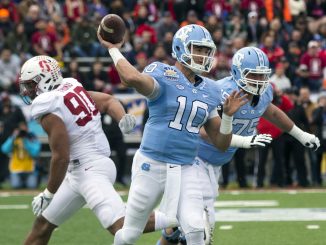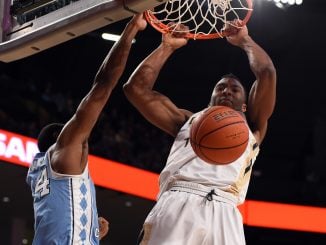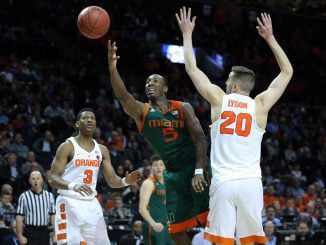
The piercing shrill of an Emergency Broadcast System alert filled the Kenan Stadium press box Saturday afternoon as one by one, the cellphones of media members notified them of a flash flood warning issued for most of eastern and central North Carolina.”This is a life-threatening situation,” the warning stated. “Do not attempt to travel unless fleeing low lying areas.”Meanwhile on the roads surrounding Chapel Hill and Durham, thousands of people were openingly defying that advice. A few miles farther to the east in Raleigh, where conditions associated with Hurricane Matthew were deteriorating an even faster rate and flood waters were already rising, another 52,800 were preparing to join them.Why?Because college football fans aren’t afraid to risk life, limb and property when it comes to watching their favorite teams play.In that sense, the storm that ravaged four states as it churned up the coast last week couldn’t have hit at a worse time. All four local ACC teams North Carolina, N.C. State, Duke and Wake Forest were scheduled to play at home Saturday.We’ll never know how many, if any, of the 20 reported fatalities and thousands of injuries attributed to Matthew involved people traveling to or from any those games. But it’s certain that there would not have been any had officials at the ACC office and at least three of the four schools shown some foresight and yes, a little courage by putting safety before its schedule.All somebody had to do was make the call, since the mechanism for postponing games was already there in black and white on the pages of the ACC Football Operations manual. It states that games “should be delayed, relocated, suspended, canceled, postponed or terminated when circumstances exist such that commencement or continuation of play would pose a threat to the safety of the game participants and/or fans in attendance.”That threat could not have been spelled out more graphically than with the words contained in those EBS alerts.Since the league offense has declined to reveal any specifics about the decision-making process, other than referring to the aforementioned policy, all we can do is speculate as to why the games were allowed to go on as scheduled Saturday. There are two possible explanations, neither of which are excusable.The first is that those in charge grossly miscalculated the threat of the storm and its potential impact.While it was originally believed that Matthew would take a hard right turn into the open waters of the Atlantic before it reached North Carolina, forecasts for hurricanes especially those as large as this one are about as accurate as a field goal kicker with the yips. That’s why the “cone of uncertainty” is always so large.”It’s amazing what 24 hours will do,” said UNC coach Larry Fedora said of the storm’s rapidly changing path, adding that he’d been in on discussions earlier in the week with athletic director Bubba Cunningham about the possibility of not playing the game as scheduled.Instead of considering the consequences and heeding the warnings as those in the SEC did by canceling the game between Florida and LSU in Gainesville and pushing back the South Carolina-Georgia matchup in Columbia until after the storm passed on Sunday, Cunningham, his fellow ADs and the ACC chose to ignore them.A far more disturbing possibility is that the ACC was pressured by its “broadcast partner” ESPN into providing the programing it was promised in that $3.6 billion deal the two parties signed come hell or (in this case, literally) high water. That’s the price that comes with selling your soul to the one-eyed devil that is television.Perhaps those in charge might have been more open to the possibility of postponing the games had the linear version of the new ACC Network already been up and running. The already operational SEC Network provided the perfect platform to show the rescheduled South Carolina-Georgia game without disrupting schedules on ESPN’s primary channels.Or maybe league officials are still squeamish about the backlash they received after pulling the plug on a UNC-Duke basketball game only hours before tipoff back in 2014 and didn’t feel like having to explain themselves again had Matthew sailed harmlessly out to sea.No matter what the reason, they took a dangerous, unnecessary gamble with the safety of everyone involved by choosing the course they did.It doesn’t matter that despite field conditions that looked better suited for an Olympic swimming event than a football game at Carter-Finley Stadium, no one one either N.C. State or Notre Dame appeared to suffer serious injury because of the slippery conditions. Or that while some players and coaches handled the wind and rain better than others, no one got got an unfair competitive advantage because of the meteorological obstacles.The ACC got lucky this time. It might not be as fortunate next time it decides to roll the dice.



